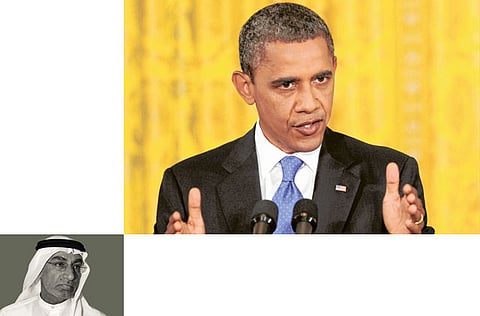US, Islamists and Arab Gulf states
Arab Gulf states are already diversifying their energy and security portfolios

The rise of political Islam is the big story of the hour in places like Egypt and the other Arab Spring states. However, the way in which the Obama administration has decided to engage the phenomenal rise of Muslim Brotherhood is raising many questions and few concerns throughout the region, especially among some Arab Gulf States — supposedly the most trusted US allies in the Arab world.
There is a general apprehension towards Washington going the extra mile in empowering the Islamists and treating them as new political allies. The message coming from Washington is that political Islam is the now darling and the choice of the moment. Many are rightly bewildered to see this sudden change in attitude and to see the red-carpet treatment given to Muslim Brotherhood delegations whenever they visit Washington.
The Obama administration sees political Islam as a moderate force capable of taming the angry Arab, bring back political stability and preserve the status quo. Washington seems to think that the region stretching from Afghanistan to Morocco is essentially an Islamic region and should be ruled by Islamists.
This new Washington consensus is not only alarming to many, but is fundamentally naive for several reasons. Firstly, the assumption that Arab Spring Islamists are politically moderate, socially progressive forces capable of living up to the challenges of building stable and prosperous democracies is yet to be put to the test. Additionally, to so naively trust them as new friends and possible allies and engage them in a serious strategic dialogue does not make political sense. Past American experience with Islamists, such as the Mujahideen in Afghanistan, shows that they can turn against the US with a vengeance at the first available opportunity.
Secondly, though Islamists came to power in some of the freest elections in recent memory, for the US to think that Islamists are the only credible force around is ridiculous. The post-Arab Spring landscape is full of political dynamism and forces of change such as liberals, secularists, nationalists are far from being politically defeated or marginalised. Above all, there is also the vast majority of independents, mostly Arab youth, who played a pivotal role in ending decades of political stagnation in the Arab world. For Washington to simply neglect them is a huge political blunder. The Islamists came to power because people voted with their hearts in the first round of elections. The alternatives to Islamists are already making a strong comeback in Egypt, Tunisia and have won convincingly in Libya. To give Islamists a free ride and consider them the final choice of the people is not very imaginative.
Thirdly, the real concern is not just that Washington seems to be somewhat naively embracing the Islamists. What is more alarming is the suddenness of the policy shift. Washington looks pathetically opportunistic in making a 180-degree turn to embrace the Muslim Brotherhood as the new norm in Arab politics. To go from the long-held position of demonising Islamists to treat them like new political darlings is too much to stomach.
Fourthly, from the Arab Gulf states’ perspective, two issues are at stake: How fast the US deserted old allies and how fast it now rolls the red carpet out to Islamists. The folks at this end are asking what the US is really up to and would it do the same with the visibly emboldened Gulf Islamists? More worryingly, decision makers in various Gulf capitals are asking, would the US also trade allies if it ever strikes a grand bargain with Iran, which is a top priority for the Obama administration in its second term? Where would that leave the Arab Gulf states? Flirting with Islamists is bad, but going for a grand bargain with Tehran is crossing an unforgivable red line.
Granted that the foundations of US-Gulf relations are as solid as ever and because of a belligerent Iran, there is a mutual urge to upgrade that relationship. However, differences over how to handle the rise of Islamists are mounting and trust of America is not necessarily at its best in some Gulf capitals.
Wisely, the Arab Gulf states are already diversifying their energy and security portfolios. At a time when everyone is preparing for the post-America world, they cannot afford leaving all their options in one basket.
Going East and moving steadily towards Asia is just one of the many options away from the unhealthy dependence on America. There is a growing belief that America is in retreat and is becoming increasingly inward looking. Asia is the future and the new global economic and financial centre.
The world is fast changing and the Arab Gulf states are fast adapting to the new regional and global realities. They are acting more independently and are no longer the little duckling of the last century, desperately in need of Uncle Sam’s protection. They are also building vast networks of new friends and allies and thinking of new strategic options and are ready to take calculated risks of their own.
The message from the Gulf is clear. It is very difficult to trust America that does not stand by its friends in times of need. It is not very reassuring to see America that swaps allies at the speed of light. All this comes at time when the US needs the full cooperation of the Arab Gulf states, much more than the Arab Gulf states need America that is banking on Arab Spring Islamists as its new allies in the region.
Dr Abdulkhaleq Abdulla is a professor of political science. You can follow him on Twitter at www.twitter.com/Abdulkhaleq_UAE.



